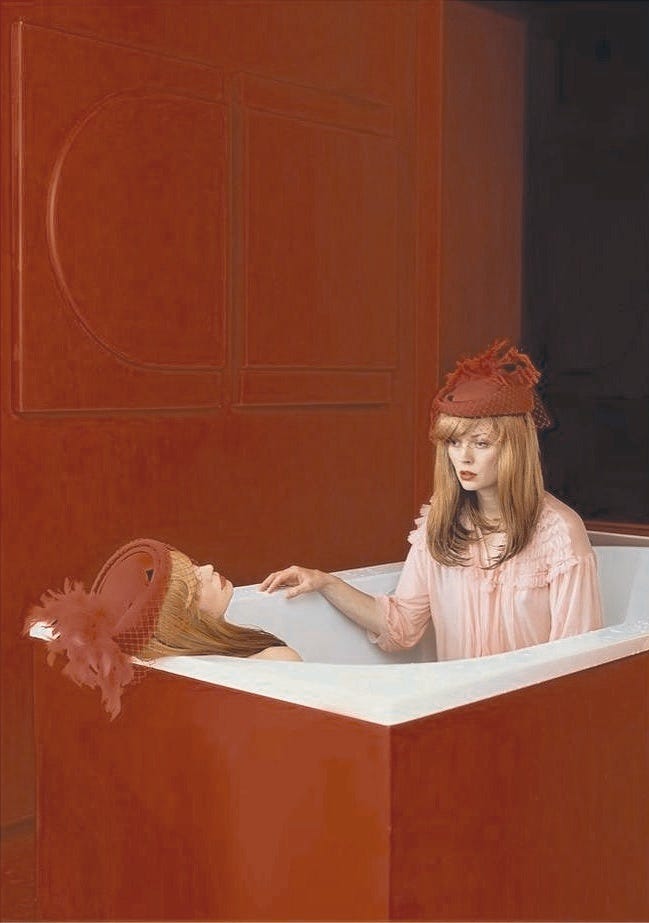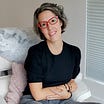Welcome to Parents That Write.
Parent writers, artists, and creators are more than just their ‘chaos’. We’re publishing books, dropping albums, optioning screenplays, and making magic every day.
HOW DO THEY DO IT? That's what we're here to find out. Each week, my guests tackle eight quick-fire questions, plus a few wildcards. But first, a peek into my own creative life:
No-Fluff Notes from my Writing Life
In May, I was in Manhattan, sat in a tight, dark auditorium with a roomful of New York Times bestselling memoirists, the real kind, not the LinkedIn bio kind. We were there for Open Secrets Live, a summit about what happens when writers throw open the doors on their private lives in public.
There were panels on open marriages, mental health spirals, family betrayals, the lot. But the undercurrent of the day was this:
How do we write about our lives without torching the people inside them?
One panellist, tossed a truth grenade with a wink: “Depiction doesn’t mean endorsement.” It’s a line worth sitting with.
Because isn’t that the risk?
Not that what we write isn’t true, but that it might be misread. That nuance won't land. And that context gets flattened. That you’ll be mistaken for someone you’re not, just for naming what’s real.
Last week, I asked about the aftermath of truth-telling - the visible responses, the people who stay or go. Subscribers who didn’t sign up for the grit (whatever that is to them).
But there’s another layer. It’s not always about being scared of how others will react. Sometimes, it’s about whether we’re ready to live with what the truth might shift inside OURSELVES. That, too, is part of the practice.
🧨 Have you ever held back, not because it wasn’t true, but because you weren’t ready for what telling it might cost, or shift in you?
Not the public fallout or the comment section but the internal aftershock. The thing you’d need to sit with once it’s ‘out there’.
Each time I hit that point, the one that feels like too much, too dangerous, too irreversible, I tell it anyway.
In case you think this is easy: it sometimes takes me months years to rev up to write something that reconfigures emotional territory I’m scared to share.
Need an example? Here’s one.
Y.e.t. every single time I manage to do it, something in me expands. And that’s how I know I’m writing in the right direction.
So now I’m asking you:
What truth have you almost told? And what would happen if you stopped almost? Let’s spill some beans, grab one another’s hands, and move forward anyway. Leave a comment, will you?
Next week, I’ll bring you : writer of My Love Notes, a fearless field guide to love...self, romantic, platonic, and everything squishy, sexy, or sacred in between.
But first, this week’s guest, and our lush interview.
MEET who doesn’t sugarcoat. She’s the force behind Motherness, an upcoming memoir that kicks Hallmark motherhood off its pedestal and replaces it with neurodivergent grit, and a whole lotta heart. At , she writes like she lives, with her middle finger raised to stigma and a soft spot for saying the unsayable.
Share a broad snapshot of your life. Who are you parent to and/or have caring responsibilities for?
I'm a mom to one human baby and one bulldog baby. Both keep me busy. One relies on me for rides; the other for walks. The rest of the time I’m either writing, reading, or painting—although I’ve been doing more writing than anything else these days. I publish stuff about autism on my Substack, The Autistic Mom. And my memoir, Motherness, comes out in September, so things are ramping up with that.
Where can we find you?
Website | Instagram | Substack
Can you share favourite praise for your writing?
Any praise is favourite praise ;) Here are some nice words about my memoir:
“Motherness is all about loving the child you’re raising and accepting the parent you are. A fiercely honest and wildly compassionate memoir. Occasionally heartbreaking and often laugh out loud funny. I loved this book.” ~ Ann Douglas, author of Parenting Through the Storm
"Julie Green's debut memoir Motherness is a deeply-felt personal account of what it is like to raise a neurodivergent child as a neurodivergent mother. But it is also much greater than the sum of those parts: Green's gorgeous writing carries this deeply human story, which is filled with curiosity, honesty, humour, and above all, love." —Harriet Alida Lye, author of Let It Destroy You
Why do you write?
I’ve been doing it for so long now, I don’t even remember the why. Ever since I was a child I have been stuck in my head: only child, poet, daydreamer, etc. People confused me (still do), so writing was how I figured shit out (still is). It’s how I make sense of the world around me and process my own thoughts and emotions. And I’m not qualified to do anything else.
What does the inside of your writing mind look like?
I’m autistic, so this question feels a bit abstract for me. The Guns N’ Roses song “Welcome to the Jungle” comes to mind, though. Writing often feels like hacking through a lot of undergrowth to forge a visible path ahead.
How is your ability to write affected by being a parent and your ability to parent affected by your writing?
Becoming a mother cracked me open. I am not the same person I was. Being a parent has altered how I see and experience everything, so that seismic shift naturally informed my writing. I wouldn’t say writing is therapy, but I have worked through a lot on the page. A whole memoir’s worth, in fact.
How often do you write with your child around or not, and what kind of writing do you get done when they are nearby?
Writing time is easier to come by now that I have a teenager who largely rots in their room and doesn’t want to hang out with mom. It was harder when my child was little, but deadlines helped. I was far more disciplined then and definitely made better use of my time because I had less of it. I think that is the way with most parents who write.
What is your best writing habit, and how did you discover it?
Probably the fact that I don’t have a set writing habit. I just sit down and do it without much pretence or fuss. I don’t need all the variables to fall perfectly into place for me to write. Of course, like any writer, I sometimes fantasize about running away from my family and sequestering myself in a nice cottage, hotel room or she-shed. But the reality is, I don’t actually need any of those things to write.
What are the three most important characteristics of being a writer who is a parent?
➡️ acceptance.
Accept that you won’t have nearly as much time or mental capacity to devote to writing as you would like.➡️ trust.
Trust that whatever you are working on will eventually amount to something of value, even if it’s currently a heaping pile of crap.➡️ patience.
Have patience because you can’t rush a good thing. Ideas need time and space to percolate. You are a writer even when you aren’t writing.
What or who is your secret writing weapon?
I’m not superstitious or precious about having to have certain types of notebooks or pens. During my years of freelancing, I spent a lot of time writing in cafes and at the kitchen table, so I got used to writing whenever and wherever I found myself. It was good training. My only real requirement is coffee, copious amounts of it. My brain is pudding without it.
What or who has been the most significant creative influence in your life?
I could not and would not be able to write without my husband’s emotional (and let’s be honest, financial) support. Freelancing has afforded me the flexibility to write. I learned the hard way, having suffered from burnout throughout my 20s, that it is not viable for me to write and work full time. I would have abandoned this dream a long time ago if it wasn’t for my partner lifting me up and believing I have the chops for it.
What motivates you to write amongst the flurry of family life?
Let’s flip that. The flurry of family life is what motivates me to write.
What unfinished writing projects do you have lying about?
A YA novel that is older than my oldest child who is 16! Someday, someday…I refuse to let this character and story go. Maybe 2027 will be the year my other baby (Toby Adams) is born into the world.
I am also partway through my next memoir, about dogs, but also not just about dogs. It may never transpire, but I’m writing it anyway.
What is the favourite sentence you’ve ever written, and why?
Oof, I’m not sure I’ve written it yet. Watch this space.
What’s your favourite quote from a writer?
“I write entirely to find out what I'm thinking, what I'm looking at, what I see and what it means. What I want and what I fear.” ― Joan Didion















What, who, me?
Another interesting interview; I always enjoying reading them. I also went and read your story about being investigated... My God, what a nightmare. It can happen to anyone, for the teeniest thing.
As for "being more me", I think I'm rather transparent in my writing, sometimes possibly too much so. I don't know... Where I can hold back is in showing my privileged situation, because it's something I struggle with. I always hoped to be able to support myself financially through my creative endeavours, be it writing, making bags, crocheting bedcovers etc, but the clock is ticking and I doubt it's going to happen! I wanted to flip the script and allow my husband to give up his highly successful but very stressful job decades ago... but now he's retired and no longer stressed. I carry that chip on my shoulder. It gets quite heavy at times. He's never berated me for not earning much money, but I feel a certain guilt about it. So that would be my hang-up. I should write about it, as I'm sure I'm not the only one in this (very lucky) position.